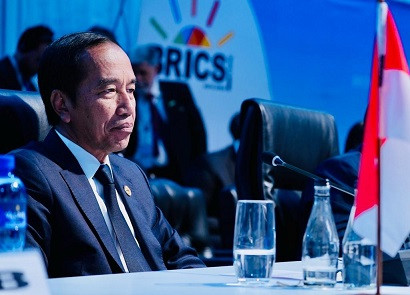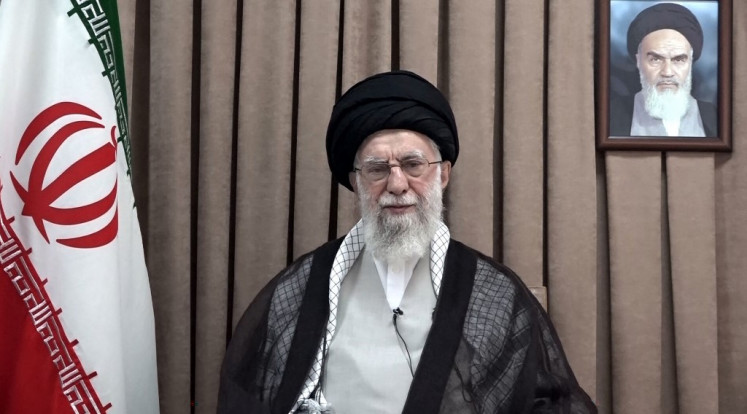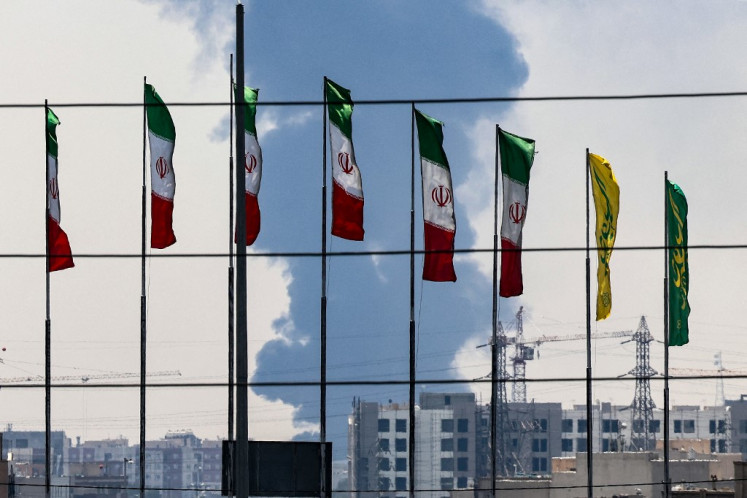Popular Reads
Top Results
Can't find what you're looking for?
View all search resultsPopular Reads
Top Results
Can't find what you're looking for?
View all search resultsRI must think on sustainability of foreign policy doctrine
While the country's nonalignment stance is laudable, the government needs to start thinking about sustaining the 70-year-old foreign policy doctrine for the long term, international relations experts have told a panel discussion.
Change text size
Gift Premium Articles
to Anyone

Analysts lauded Indonesia’s participation at the 15th BRICS Summit in South Africa last week as a strategic play to signal its dissatisfaction with the Western-dominated status quo that impedes equitable development, but they also suggested Jakarta to begin formulating sustainability plans to deal with geopolitical rivalries and to ensure that its foreign policy stance remained “free and active”.
Speaking at the summit in Johannesburg in the capacity of Indonesia’s 2023 ASEAN chairmanship, President Joko “Jokowi” Widodo lamented the “injustice” of the current global economic order and called for collective action by the Global South against “discriminatory” trade policies, citing some of Jakarta’s own misgivings with the World Trade Organization (WTO) and the European Union.
His delivered his remarks before the leaders of Brazil, Russia, India, China and South Africa and other invited delegates as the economic grouping sought to expand its membership to bolster its emerging role as a counterpoint to the Group of Seven (G7) industrialized nations.
But Indonesia was not among the six new BRICS states announced last Thursday. Jokowi said later that Indonesia was “in no rush” to join the group, as it preferred to carefully calculate any such decision.
This sparked mixed reactions from foreign policy circles, with some applauding Indonesia’s restraint while others pointed to a missed opportunity in benefiting from becoming a BRICS member.
It was widely agreed, however, that Jokowi’s decision to attend the summit and deliver his strongly worded remarks was a way to “daunt” the West amid ongoing disputes while also allowing the government to reiterate Indonesia’s “free and active” foreign policy stance, a doctrine of nonalignment it instituted in 1948.
“I think that Jokowi’s presence at BRICS was a symbolic gesture to the United States [and its allies] that we are not a country without alternatives,” Andrew Mantong, an international relations expert from the Centre for Strategic and International Studies (CSIS), told a panel discussion on Monday.
Other panel experts suggested that, having declared itself a “free and active” middle power keen to amplify the voice of the Global South, it was in Indonesia’s interest to sit on the fence as regards BRICS.
As the world grapples with the tension of the China-United States rivalry, Indonesia has reaffirmed its stance of nonalignment, maintaining its ties with both Beijing and Washington, regardless of any bumps.
Indonesia maintains strong military ties with the US, despite complex trade issues sometimes clouding the relationship. Meanwhile, the country has security concerns over Beijing’s claims in the South China Sea, which loom over their otherwise strong economic ties.
Regarding the war in Ukraine, Indonesia defied calls last year during its Group of 20 presidency to ban Russia from the G20 Bali Summit, refusing to jump on the US-led sanctions bandwagon against Moscow, though it later produced a joint statement condemning the invasion.
Tried and tested
It remains unclear how Indonesia plans to ensure the sustainability of its foreign policy, especially with the ever-changing geopolitical landscape now involving more non-state actors.
“There needs to be a strategy to deal with uncertainties. Our strategy works for now, but we don’t know if it will work in the future,” Andrew said.
He explained that Indonesia’s free and active foreign policy was formulated decades ago, when the world order was still primarily composed of state actors. But with the “multiplex” contemporary world order, non-state actors such as private companies, civil society groups and powerful individuals were beginning to assert their influence, calling on the agility and adaptability of nonaligned countries like Indonesia.
“One of the most important things we must do is recognize that the global economy and politics are highly intertwined, a point [policymakers] sometimes ignore. We must start considering clear metrics, a clear threshold of our limits on when we should change our stance,” said CSIS executive director Yose Rizal Damuri.
Dewi Fortuna Anwar, an international relations expert from the National Research and Innovation Agency (BRIN), suggested that strengthening the country’s closest diplomatic cohorts like ASEAN was key to the sustainability of Indonesia’s foreign policy doctrine, whereas a weak regional bloc would harm the country’s stance.
“Indonesia is nonaligned in ASEAN. We have transferred this vision to the ASEAN Outlook on the Indo-Pacific, which needs to be actualized. ASEAN’s central role must also be actualized. If ASEAN is weak, then find ways to strengthen it.
“The free and active policy is over 70 years old. It is tried and tested, but we have to do whatever we can to maintain it,” Dewi said.









